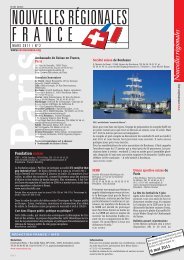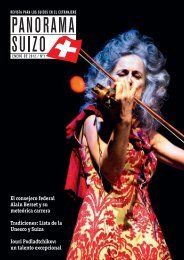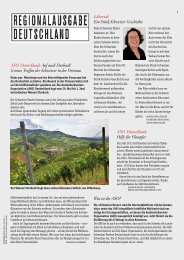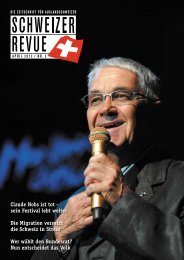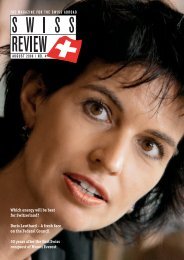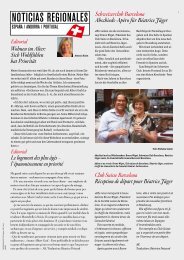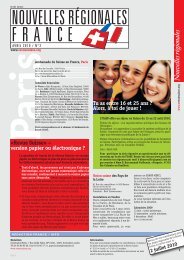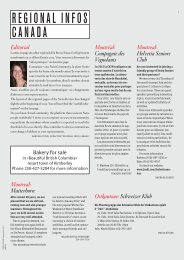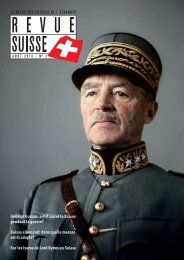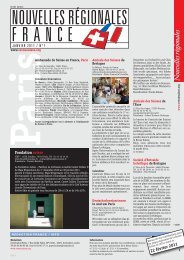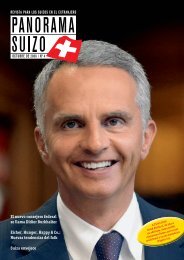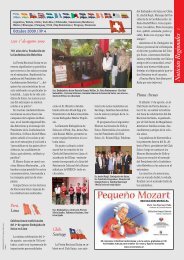Download PDF Swiss Review 1/2012 - Schweizer Revue
Download PDF Swiss Review 1/2012 - Schweizer Revue
Download PDF Swiss Review 1/2012 - Schweizer Revue
You also want an ePaper? Increase the reach of your titles
YUMPU automatically turns print PDFs into web optimized ePapers that Google loves.
18 IntervIew<br />
“Seeing the EU as nothing more than an export club<br />
is completely wrong”<br />
Michael Reiterer was the EU ambassador in Berne from January 2007 until the end of 2011. Even during<br />
difficult times, he made a major contribution to enabling constructive discussions between Switzerland<br />
and the EU. An interview at the time of his departure.<br />
By Barbara Engel<br />
swiss <strong>Review</strong> January <strong>2012</strong> / No. 1<br />
“swiss review”: You were the first EU<br />
ambassador to come to Berne in 2007. Was<br />
Berne a destination you wanted at the time?<br />
michael reiterer: Yes, even in the EU<br />
system you have to apply for a job, and I applied<br />
for the Switzerland post. I had lived in<br />
Switzerland previously – I spent two years<br />
studying in Geneva and two years with the<br />
Austrian delegation to GATT. I’m now returning<br />
to Brussels with nine years’ experience<br />
of Switzerland.<br />
Why were you interested in the position<br />
of EU ambassador to Switzerland?<br />
I was attracted by the prospect of establishing<br />
something new. There had previously<br />
been no EU representation in Berne.<br />
I started off with nothing more than a<br />
rented building. I also<br />
found the opportunity to<br />
live and work here for a<br />
longer period of time appealing<br />
as I was already very<br />
familiar with Switzerland<br />
and its virtues.<br />
Relations between Switzerland<br />
and the EU have become strained<br />
in recent times. The tone adopted is sometimes<br />
not very friendly. Are you glad to be leaving<br />
Berne at this point?<br />
No. I don’t believe relations have become<br />
more strained. The issues have always been<br />
more or less the same since the <strong>Swiss</strong> voted<br />
against joining the EEA in 1992. We have<br />
constantly been seeking a modus vivendi ever<br />
since. This has to be adapted from time to<br />
time because the EU has changed.<br />
How has the EU changed?<br />
First and foremost, it has increased in size<br />
from 12 to 27 states. The internal market has<br />
grown and deepened. The framework conditions<br />
have changed. As a consequence, we<br />
also need to find new forms of cooperation<br />
between the EU and Switzerland.<br />
The EU was and<br />
remains a peace<br />
project. That<br />
comes at a price.<br />
From a <strong>Swiss</strong> perspective, Brussels sometimes<br />
makes unachievable demands. This has caused<br />
fronts to harden.<br />
I don’t wish to talk about fronts because<br />
we are not fighting a war. Switzerland clearly<br />
wants to participate in the European Union’s<br />
internal market. The EU, for its part, has to<br />
ensure that the rules that apply within the<br />
internal market are uniform across the board.<br />
Discussions with Switzerland about this are<br />
currently ongoing. I am confident that now<br />
that the parliamentary and Federal Council<br />
elections in Switzerland are over we can<br />
adopt a more offensive approach to these<br />
discussions again.<br />
In Switzerland, there are several sensitive issues<br />
associated with fears about the free movement<br />
of persons and the EU.<br />
The buzzwords are “foreign<br />
judges” and “social tourism”.<br />
Can you understand this?<br />
I’ve got an anecdote to<br />
tell you about this. A cantonal<br />
politician once told<br />
me that foreign judges from<br />
Lausanne introduced the<br />
right to vote for women. This illustrates how<br />
relative the term “foreign judges” is. Switzerland<br />
is a member of several international<br />
organisations that have their own jurisdiction.<br />
For instance, Switzerland does not have<br />
an issue with being subject to WTO jurisdiction<br />
on trade disputes. There are also <strong>Swiss</strong><br />
judges at the European Court of Human<br />
Rights, and a <strong>Swiss</strong> judge even represents the<br />
principality of Liechtenstein at the EFTA<br />
Court. It would appear that exporting foreign<br />
judges does not present a problem. As<br />
far as “social tourism” is concerned, the<br />
<strong>Swiss</strong> State Secretariat for Economic Affairs<br />
will readily confirm that the institutions of<br />
the <strong>Swiss</strong> social security system would be in<br />
a very poor state if it were not for the contributions<br />
of foreigners. Fears arise because<br />
sensationalist and populist language is used.<br />
Which areas are on the EU wish list for the<br />
bilateral agreements with Switzerland?<br />
The EU does not have a wish list. But<br />
there are some issues that are being negotiated,<br />
such as free trade in agriculture. Switzerland<br />
is holding things up here. There are<br />
also negotiations on the internal electricity<br />
market, an area where common interests exist.<br />
An analysis from Brussels in “<strong>Swiss</strong> <strong>Review</strong>”<br />
suggests that Switzerland’s approach is<br />
perceived as “cherry-picking” in Brussels. Is<br />
that true?<br />
I recently put this question to the President<br />
of the European Council, Herman van<br />
Rompuy. He said that it was certainly not<br />
an expression he would use. There is no<br />
question that Switzerland benefits from political<br />
stability and economic prosperity in<br />
Europe. The <strong>Swiss</strong> government and most of<br />
the <strong>Swiss</strong> people also appreciate this. It is<br />
therefore important that the EU is seen as<br />
a project in which everyone plays a part.<br />
When it comes to developing Europe further,<br />
for example through expansion, active<br />
participation is vital. Relationships between<br />
states are like those between people – you<br />
communicate, think things through together,<br />
work together and when one refuses<br />
to talk, the others notice this. The same will<br />
also apply to developments we have yet to<br />
encounter.<br />
The keyword is development of the European<br />
Union – a peace project has turned into a commercial<br />
association.<br />
Seeing the EU as nothing more than an export<br />
club is completely wrong. It has actually<br />
developed the other way round. The European<br />
Economic Community was set up<br />
first, and this later became the European Union.<br />
The latter incorporates close cooperation<br />
and integration in the fields of justice,<br />
migration, asylum, foreign policy and security<br />
policy. Of course, the internal market



